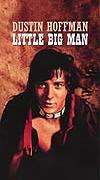Best Indian = white man
No One Ever Sees Indians: “On Stealing a Native Identity”While Dances with Wolves saw a more accurate Native American representation it was still, in the end, a movie about a white man’s experience among a “vanishing race.” Yet again, a white man “becomes” Indian only to see the Indians vanishing as Dances with Wolves rides on, new identity intact. Armando Prats illustrates this in his book when he writes, “Such an authorization of the hero’s Indianness functions not to establish the Indian’s humanity, or to reveal something like the autochthonous wisdom that recognizes a common bond with the white man. Instead, it tends to announce the almost obligatory moment of perspicacity …whereby the Indian, conceding his imminent doom, defers to this privileged white man.”
The idea of assuming a Native Identity goes back to the earliest westerns, including the much-loved Little Big Man. Prats examines a scene where Jack Cabbe (Dustin Hoffman) returns to the Cheyenne and enters the lodge of Old Lodge Skins (Chief Dan George), now blinded, and hears of the numerous deaths at the hand of the white man. Jack cries out against the white man. While it shows Crabbe’s sympathy for the Cheyenne and his being a part of the tribe, as Prats writes, “It is in part his censure of the white man that empowers Jack to become …the narrator. But such denunciations also exonerate him from any possible blame for the actions of his race.”


1 comment:
I'm willing to give the film Little Big Man a pass, because I don't recall many films attempting what it attempted prior, but by the time Dances with Wolves came out, this method of story telling had become a trope with Avatar being the latest outlandish version (even more interesting because we don't even need the native anymore, hence no one has to feel any honest remorse).
Post a Comment